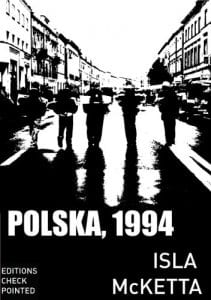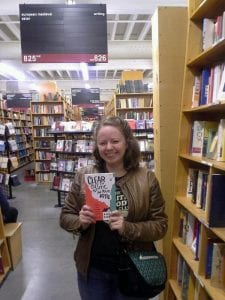Having the chance to live in Chile as a young child and then Poland as a teen, the Idaho-born native experienced the international barriers as well as the bridges of language first-hand — what it was like not to be understood. “It made me look hard at what I was saying and how I was communicating,” she recounts.
How that manifests on the web is that Isla strives for clarity and concision in her writing. Yet, unlike what most people think, she explains that concision isn’t just communicating in the shortest way possible: “It’s really about communicating in the shortest way that conveys the best sense of the idea,” she relates. “Just as I could explain “living abroad made me care about language,” it wouldn’t convey the same understanding of why I care about language.”
Seattle24x7 was delighted to exchange both words and ideas with Isla about writing for the Web.
Seattle24x7: You are immersed in language, especially as it applies to the Internet. What ignites your passion about writing?
 Isla: Language is a kind of playground for me. Because I speak several languages well (though not as well as I used to), I love to bounce languages off of one another to get a deeper understanding of what words really mean and where we’ve lost their energy along the way (dead metaphors, etc.). That’s helpful in writing web content because I can keep my writing alive. It’s even more important in poetry, the one place where I’m re-embracing the wonder of not being (immediately) understood. Credit to my MFA advisors for helping me find the linguistic flexibility to exist in both spheres.
Isla: Language is a kind of playground for me. Because I speak several languages well (though not as well as I used to), I love to bounce languages off of one another to get a deeper understanding of what words really mean and where we’ve lost their energy along the way (dead metaphors, etc.). That’s helpful in writing web content because I can keep my writing alive. It’s even more important in poetry, the one place where I’m re-embracing the wonder of not being (immediately) understood. Credit to my MFA advisors for helping me find the linguistic flexibility to exist in both spheres.
Seattle24x7: At Moz and Portent, you led content management activities for two of Seattle’s most prominent SEO firms. What is your assessment of content writing for SEO? Does it encourage best practices or is it a detriment to better writing?
Isla: When I write for the web, I definitely have an inherent bias toward the semantics of search, but on a higher level I think than the average keyword-based writing. My job as a web writer is to connect with an audience — to speak directly to their needs, which means keeping that audience top of mind all the time as I write.
So, for example, if I’m writing for Ookla about what roaming speeds a US traveler might encounter, I’m thinking about why someone’s reading this article (they’re traveling abroad, they need to connect, they might be reconsidering their mobile plan) and trying to speak to those needs. It’s only natural, then, to include all the relevant keywords along the way. Even some the bots haven’t thought of yet. This is what Rand Fishkin talks about when he says that writing for a searcher’s query matters most. If you fundamentally write with people in mind, search engines will eventually catch up. I hope.
 An editing pass to check that you actually used your keywords never hurts, though.
An editing pass to check that you actually used your keywords never hurts, though.
Seattle24x7: What is your best advice for Website marketers as it relates to adding Web content? Do you advocate analytics-driven writing (what people are searching for?) Or would you simply follow the Google trope of “Just write great content” and the rest will take care of itself?
Isla: Well, you can’t just write great content because if I were to write a mind-blowingly thoughtful review of a poetry anthology for Speedtest Insights, it would probably hit the floor with a tiny little “tink” having never been read by anyone. As it should.
The very best advice I can offer is to deeply understand your audience and then write things that help them. That can mean helping them solve a problem, be entertained for a few minutes, look smart to their friends…you have many, many options once you get to know their wants and needs.
The word empathy gets thrown around a lot these days, but the more you can be the Deanna Troi of content marketing, the better. Find your audience where they’re at. Sit with them and listen as they share their deepest fears, stumbles and successes. Only then can you create content that matters at all.
Seattle24x7: It has been said that people do not read online, but rather skim. Do you think this is true? If so, should Web authors write with that in mind?
Isla: Oh yes, definitely. I’m a skimmer online and off. Not that everyone skims. I have very dear friends who read every word (online and off). I usually ask them months from now what it was that happened in a book anyway.
 Web authors should always write with both skimmers and deep readers in mind. When I started writing book reviews and literary essays for my writer friends’ websites, I brought the web-writer habit of breaking text up with subheads, lists and images to make it scannable. And I can tell you that even the nerdiest of creative writers saw how that helped readers. And if your subheads are enticing enough, you can even seduce skimmers into reading a little more deeply than we might otherwise be inclined.
Web authors should always write with both skimmers and deep readers in mind. When I started writing book reviews and literary essays for my writer friends’ websites, I brought the web-writer habit of breaking text up with subheads, lists and images to make it scannable. And I can tell you that even the nerdiest of creative writers saw how that helped readers. And if your subheads are enticing enough, you can even seduce skimmers into reading a little more deeply than we might otherwise be inclined.
Keep in mind that some of the advice you’ll see out there for making copy scannable is straight up wrong. I dare you to scan down a page full of one-line sentences and come back to me a week later with any idea of what that content really said. Allowing yourself to alternate between short and long (just not Hemingway long) sentences and paragraphs gives readers a picture of what the text looks like to hold onto like an anchor in an online sea. And an amazing illustration never hurt.
Seattle24x7: Tech companies have been under fire for neglecting their larger role as publishers and community platforms. A recent walkout at Google was a protest against the company’s policies on sexual discrimination in the workplace. What is your read on the failings inside techdom?
Isla: There are a lot of really bright, talented people in tech who (beyond a few bad actors) are usually well-intentioned, but in general we’re too narrowly focused. I don’t know if our problems stem from the fact that we’re too passionate or idealistic, but well-intentioned is not good enough. We also have to ask ourselves if we’re being well received.
To do that, we have to look beyond our in-groups and personal experience. If you’re creating a product that ignores all precedent and fails to consider life experiences beyond your own, you’re putting your ego today ahead of the greatness you could achieve. A little humility goes a long way.

Seattle24x7: You are an avid reader and reviewer of books. Are there any books you would recommend that raise consciousness on these issues?
Isla: When I had a son, a white, male coder friend of mine from a very conservative background recommended I read “Between the World and Me” by Ta-Nehisi Coates, and I loved him for that. Beside the fact that it’s a fantastic book, it took me outside my comfort zone and brought me back to my own humility.
The very best book you can read to be a better human is one that makes you want to turn away because it challenges you in all the ways you secretly know you need to grow. Bonus points if it’s poetry, literary fiction or essay. Too many business books package things we know already into little maxims that let us feel smart about ourselves without actually growing.
Read Carmen Maria Machado to get inside the richness of a woman’s mind. Let Heidi Julavits and Paige Cooper teach you about the unintended consequences of our actions. Dive into the individual tragedies in Elena Georgiou’s “The Immigrant’s Refrigerator” to remember how different we all are (and how much the same). Or discover what empathy really means with Ijeoma Oluo. Most importantly, just read! [24×7]
Visit Isla McKetta’s Book Review Blog, “A Geography of Reading,” at islamcketta.com/





















